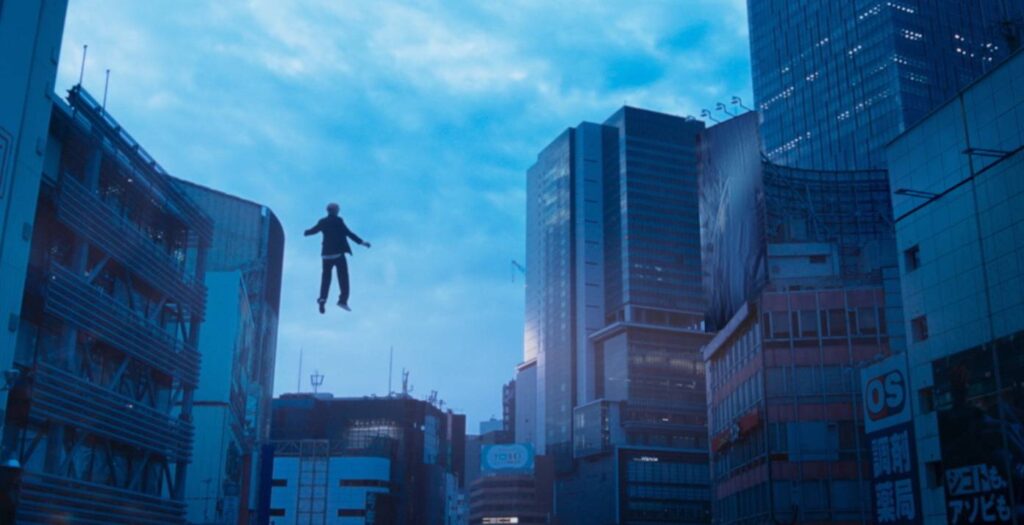Would you throw away your success and future if it wasn’t filling your soul? That’s the crux of Blue Period (2024). Originally written by Tsubasa Yamaguchi, Blue Period is an Eisner-award-winning coming-of-age story about the power of passion and dedication and how art awakens the soul and forms deep connective tissues between you and the world.
Directed by Kentaro Hagiwara, Blue Period (2024) follows Yatora Yaguchi (Gordon Maeda) through his sophomore year of high school. He excels in sports and academics, but in the end, he only does it to get good results. He only does it to make his parents happy, and ultimately, it’s all lost its shine.
When he stumbles into an art room after having his day disrupted by the confident Ryuji Ayukawa, who goes by Yuka-chan (Fumiya Takahashi), he finds a new future in art. By choosing to reconstruct his future from something new, the film follows him through the year as he aims to get accepted into the prestigious Tokyo University of Art (TUA), an art school, going against his parent’s set path for him. In uncharted territory, Yatora has to explore what life means to him and submerge himself in the unsettling feeling of failure to find his new passion. Yatora’s journey is one of competition, compulsion, despair, and beauty, made whole by the people he meets.
When looking at Blue Period, Yuka has always been my favorite character, and the live-action adaptation has captured him with a somber beauty needed for the intensity of his arc. Yuka’s complexity from the source material is present in the Blue Period live-action—but one large change in the localization is that he uses masculine pronouns instead of feminine ones.

That said, he doesn’t conform to what people consider normal, but at the same time, we see a layered performance that allows him space to explore his gender identity. Often discussed when looking at the character, Yuka has been read as simply being a gay teen who cross-dresses as a way of accepting his romantic feelings toward men. Yuka has also been seen as a trans-femme character, asking for his name to be Yuka instead of Ryuji and using feminine terms for himself—in the source material.
But no matter how you read him as a character, Ryuji’s complexity is the reality of life for many queer youth. Questioning who you are, what you love, and how you want the world to see you. Ryuji is still a teen and doesn’t have to have everything figured out. In the Blue Period live-action, Ryuji’s arc is different and similar to the source material. However, in focusing on him as a teen boy trying to understand himself, Ryuji doesn’t carry the same weight as Yuka does in manga or anime. That said, Ryuji remains a vulnerable and pivitol queer character in the story and one that captures why she resonated with so many who read the manga when it first came out—myself included.
Ryuji is Yatora’s foil, but his passion doesn’t mean that he has it all figured out. It’s also what connects Yatora to him as an empathetic tether. One stark change to the source material is that Yatora is not as unlikable. This is probably due to the reduced time the story has to complete itself. But it also means his moment with Ruka in the aquarium when he says, “I really admire you,” has a different weight. In the source material, it’s a large step forward after he’s spent most of his time mistreating Ryuji. Here, it’s closing a distance, showing that Yatora is beginning to connect with others even if he doesn’t understand them.
Both iterations capture the heart of the story, but they do it differently—especially since Yatora does not refer to Yuka as anything other than his given name, Ryuji. In some ways, the largest change in the film is that it is all about Yatora and who he is in relation to others, not necessarily about deepening our understanding of those secondary characters.

Blue Period is well known for its beautiful art both in anime and manga, particularly when Yatora’s anxiety begins to paralyze him or when he begins to find freedom in art. The Blue Period live action captures these emotions by meeting them head-on through special effects. Entering the film, I worried these moments would feel hollow or artificial in live-action form, but that isn’t the case. Instead, there is a clever balance that keeps Yatora’s intense moments as resonating introspective moments. They don’t become big or unwieldy. Instead, they drop the audience directly into Yatora’s head.
The Blue Period live-action also has one large element working against it that I briefly mentioned above: pacing. In one two-hour film, audiences have to ride with Yatora through his depression, passion, burnout, and the relationships he forms along the way, featuring most of the manga’s extended ensemble of characters. This adaptation has streamlined emotion. That sentence may feel sterile, but it’s anything but. Our time with Yatora, while short in comparison to the source material, does not lack any intensity. This is still a universal story and one that hits you like a ton of bricks.
Yatora’s path is a lonely one. His all-or-nothing attitude of devotion means that when he turns his back on sports and looks toward art, he leaves his friends. As he begins to make new ones, each one is a teacher to him in one way or another. Yatora is one of the loneliest characters in Shonen, and the film captures that perfectly. He spends so much time trying to reconnect to himself that he doesn’t realize immediately that he has to connect to others. Watching him grow into his new idea of what he wants to be is deeply moving. It’s also painful if you have ever found yourself in the same position.

Unlike other coming-of-age stories, Blue Period (2024) sticks to its source material in its focus on not glamorizing art. Yatora isn’t immediately good, and just like students studying for traditional entrance exams make themselves sick with anxiety and exhaustion, the same happens with art. Switching to art isn’t easier for Yatora, in may ways, it’s the hardest and scariest thing he’s done, especially in the last act of the film as the TUA entrance exam approaches and the audience sees what he has put his body through.
Mentally, as well, we see how Yatora has come to understand himself and the multiplicity within himself and become comfortable with the insecurity that comes with it. For his performance, Gordon Maeda is stellar. He’s locked into the vulnerability and tension of growing up and plays Yatora with an authenticity that radiates in every sequence.
Coming of age isn’t easy; it’s lonely and scary. Taking a step toward your future is the same as well. All of that is captured in this adaptation; in some ways, its medium hits the desperation and panic even harder. Because of this, Blue Period (2024) stands as a near-perfect adaptation. It captures the heart of the story. It captures Tsubasa Yamaguchi’s attention to vulnerability and the importance placed on becoming someone you want to become instead of who you’re expected to be. It’s also the perfect opportunity for new audiences to experience one of the most important stories of the last decade. While the changes around Yuka cut some of the story’s impact, it’s still powerful.
Blue Period screened as a part of Japan Cuts 2024.
Blue Period (2024)
-
Rating - 9/109/10
TL;DR
Coming of age isn’t easy; it’s lonely and scary. Taking a step toward your future is the same as well. All of that is captured in this adaptation; in some ways, its medium hits the desperation and panic even harder. Because of this, Blue Period (2024) stands as a near-perfect adaptation.







